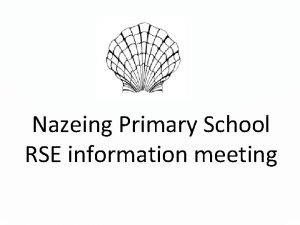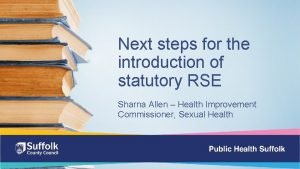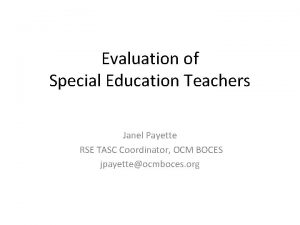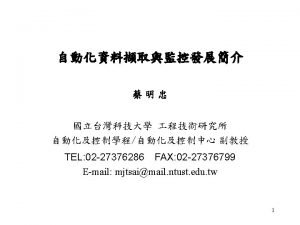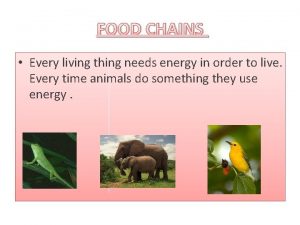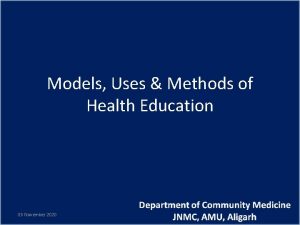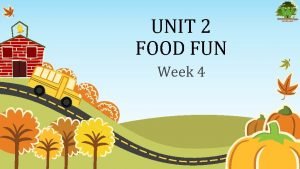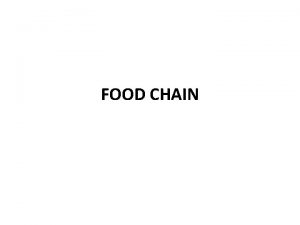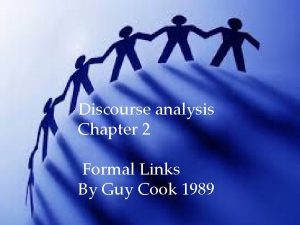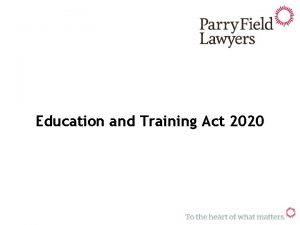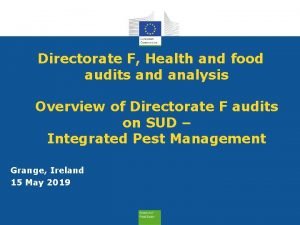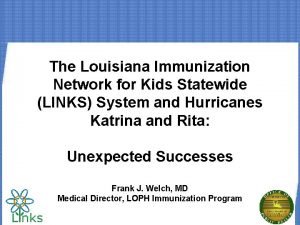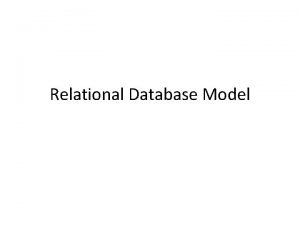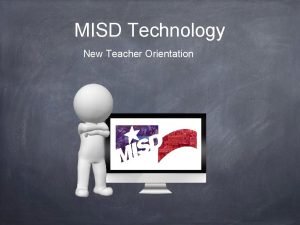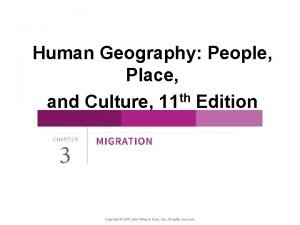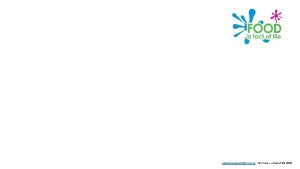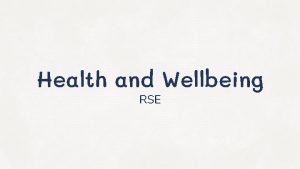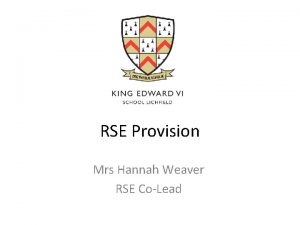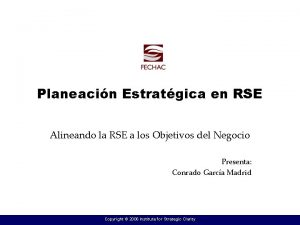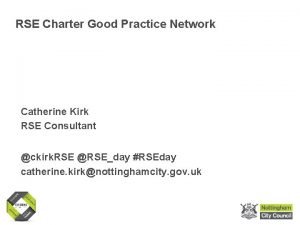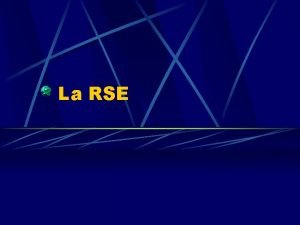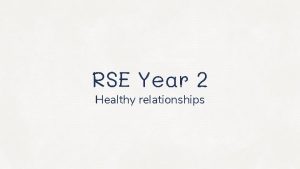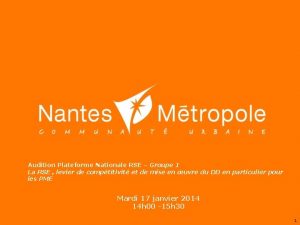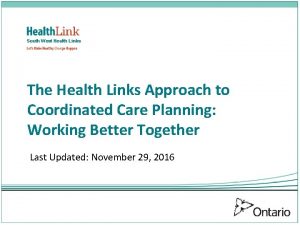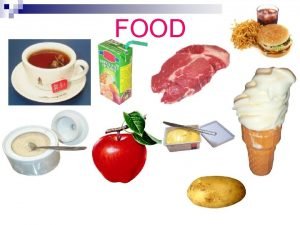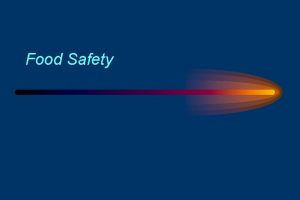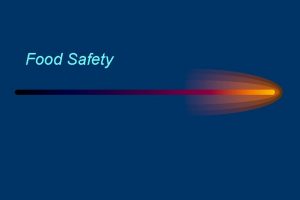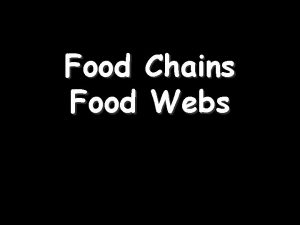RSE and Health Education 2020 links to food




















- Slides: 20

RSE and Health Education 2020, links to food and nutrition and your role www. foodafactoflife. org. uk © Food – a fact of life 2020

Webinar outline • RSE and Health Education overview. • RSE and Health Education – when? • Aspects of the curriculum relevant to food and nutrition. • Your role in planning and delivery. • Support from Food – a fact of life and the Food Teachers Centre. • Other sources of information and support. www. foodafactoflife. org. uk © Food – a fact of lie 2020

RSE and Health Education curriculum - overview • Relationships Education is compulsory for all pupils receiving primary education and Relationships and Sex Education (RSE) is compulsory for all pupils receiving secondary education in England*. • Health Education is compulsory in all schools in England except independent schools. • Personal, Social, Health and Economic Education (PSHE) continues to be compulsory in independent schools and these schools must meet the Independent School Standards. However, independent schools may find the Health Education element of the curriculum helpful. • Parents and carers are the prime educators for children on many of the matters covered in the curriculum and schools complement this. RSE and Health Education statutory guidance – Df. E *This includes maintained, nonmaintained or independent schools with sixth-forms, including academies and free schools, nonmaintained special schools, maintained special schools and alternative provision, including pupil referral units. The statutory requirements do not apply to sixth form colleges, 16 -19 academies or Further Education (FE) colleges. www. foodafactoflife. org. uk © Food – a fact of lie 2020

RSE and Health Education curriculum - overview • The aim of the RSE and Health Education curriculum is to put in place the key building blocks to healthy relationships, good mental health and healthy, active lives. • Primary: healthy, respectful relationships, focusing on family and friendships, in all contexts, including online. This sits alongside the essential understanding of how to be healthy. • Secondary: teaching will build on the knowledge acquired at primary and develop further pupils’ understanding of health, with an increased focus on risk areas such as drugs and alcohol, as well as introducing knowledge about intimate relationships and sex. • Teaching about mental wellbeing is central, especially as consultation found that their children’s happiness is a priority for parents. www. foodafactoflife. org. uk © Food – a fact of lie 2020

RSE and Health Education curriculum - overview • Compulsory subject content must be age appropriate and developmentally appropriate. • It must be taught sensitively and inclusively, with respect to the backgrounds and beliefs of pupils and parents while always with the aim of providing pupils with the knowledge they need of the law. • Curriculum compliments many National Curriculum subjects and schools should look for opportunities to find links between subjects and integrate teaching where appropriate. • A whole school approach to wellbeing and health should also be taken into account. www. foodafactoflife. org. uk © Food – a fact of lie 2020

RSE and Health Education curriculum – when? • RSE and Health Education will become compulsory from 1 September 2020 and schools should continue to prepare for this date where possible. • However, due to the coronavirus and closures, schools who are not in a position to implement fully from September have been granted some flexibility in delivery until summer 2021. • To ensure teaching begins as soon as possible, Df. E is encouraging schools to take a phased approach (if needed) when introducing these subjects. • Schools should consider prioritising curriculum content on mental health and wellbeing, as knowledge on supporting your own and others’ wellbeing will be important as pupils return to schools. www. foodafactoflife. org. uk © Food – a fact of lie 2020

Aspects of the curriculum relevant to food and nutrition The aspects of the RSE and Health Education curriculum that relate to food and nutrition are: o Physical health and mental wellbeing: healthy eating. * o Physical health and fitness. o Health and prevention. Important The guidance states that secondary schools should continue to develop knowledge on topics specified for primary as required and in addition cover the specified secondary content. *There are other strands to the statutory guidance that must be considered alongside Physical health and mental wellbeing to ensure that the curriculum is covered fully. www. foodafactoflife. org. uk © Food – a fact of lie 2020

Your role in planning and delivery Schools will have to have a policy in place (with subject content, how it is taught and who is responsible). We suggest that you use the documents that we have provided to: 1. EXAMINE AND REVIEW - What you already teach at KS 1 -2, KS 3 -4 and how this meets the requirements for 2020. 2. CONSULT AND EXPLAIN - Contribute to the new POLICY document. Inform the PSHE Co-Ordinator and SLT how what you teach meets the requirements, and explain what you teach and assess in your lessons. 3. PLAN AND COMMUNICATE - Provide mapping and keep this with your subject scheme of work (examples provided). 4. REPORT - on achievements of your students

Key documents to access • One-page summary of requirements and suggested action plan. • BNF mapping of requirements against the curriculum. Download and keep with your subject planning. • Example for school mapping to adapt for your school. • Government requirements. Please note that requirements at KS 3 are repeated and built on further in KS 3. Download and keep with your subject planning.

Example mapping

Delivery • For most schemes of work in Food and Nutrition/Food Technology this will not demand new content to be taught, but strengthens what exists • A unique opportunity to give practical application to the skills and knowledge “Planning and preparing a range of healthy meals” “Personal hygiene when preparing food, bacteria” • “What constitutes a healthy diet” Real dishes and recipes to take home rather than simply posters or notes • “Health risks of a poor diet” – an opportunity to understand adjust their diet

Co – Ordination (Whole School Planning) • Offer your expertise more widely to co-ordinate the Healthy Eating strand. • You may aware that many other teachers are contributing to teaching ‘healthy eating’ in a range of subjects and topics across the school (Science, PE). • Offer to be the lead person to ensure that teaching is consistent, well planned and accurate by using the government recommended teaching models. Direct them to use current teaching resources for appropriate age groups, such as Core Food Competences, Food a Fact of Life website, NHS Eatwell Guide, Sugar Smart and so on. • OFSTED will be looking for a co-ordinated, consistent approach.

Reporting and Communications • Build this into your assessment and formal school reporting process. Report on these specific achievements • Publicise how your lesson contributes both to National Curriculum and PSHE 2020 – Communicate internally – PSHE Co-Ordinator, SLT, governors – Communicate to pupils – perhaps through a display – Communicate externally - announcement on your subject website section or other communications with parents

Why this is important? • In addition to compulsory national curriculum ‘Cooking and Nutrition’ at KS 1 -3 • PSHE 2020 is also compulsory (even in academies) • When schools might consider reducing time and resources for ‘Cooking and Nutrition’ PSHE 2020 may prevent the subject from being under threat.

Overview • Relationships and Sex Education is compulsory for all pupils in primary and secondary education in England from September 2020. • Health Education is compulsory for all pupils in primary and secondary education in England, but not those attending an independent school. • There is now flexibility in delivery until summer 2021 with a phased approach and a focus on mental health and wellbeing encouraged by Df. E. • The aspects of the RSE and Health Education curriculum that relate to food and nutrition are: o Physical health and mental wellbeing: healthy eating. o Physical health and fitness. o Health and prevention. www. foodafactoflife. org. uk © Food – a fact of lie 2020

Support from Food – a fact of life BNF has mapped the elements of the new RSE and Health Education curriculum that relate to food and nutrition against the D&T: Cooking and nutrition and Science national curricula, as well as the Core Competences for children and young people. • FFL RSE and Health Education mapping KS 1 -4 • FFL RSE and Health Education mapping (primary) • FFL RSE and Health Education mapping (secondary) A whole school approach • Whole school food policy • Food provision • Breakfast clubs • Healthy lunchboxes • Curriculum, qualifications and frameworks • Guidelines for school education resources about food www. foodafactoflife. org. uk © Food – a fact of lie 2020

Support from Food Teachers Centre • PSHE 2020 has featured in recent newsletters – can be found on our website www foodteacherscentre. co. uk (April Newsletter can be found there https: //ymlp. com/z 4 hg. G 1) • Closed group – Resource Bank folder with example planning, mapping and advice – Mentorship programme – Topic tag and search facility highlights shared work

Other sources of information and support Nutrition. org. uk PSHE Association There a number of Healthy Schools services that offer advice and support including: Healthy Schools Leeds Healthy Schools London Healthy Schools North Yorkshire Healthy schools rating scheme - a self-assessment tool designed to help schools improve the health and wellbeing of their pupils. www. foodafactoflife. org. uk © Food – a fact of lie 2020

More training … • Adverse reactions to food and managing allergens in the classroom 23 September 2020 at 4. 30 pm • Primary skill-a-long (bread) 6 October 2020 at 4. 00 pm • Anytime – online training To find out more and to book, go to https: //www. foodafactoflife. org. uk/training/ More PPD information, support and newsletter sign-up: https: //www. foodafactoflife. org. uk/professionaldevelopment/ www. foodafactoflife. org. uk © Food – a fact of lie 2020

RSE and Health Education 2020, links to food and nutrition and your role For further information, go to: www. foodafactoflife. org. uk © Food – a fact of life 2020
 What is rse
What is rse Statutory rse
Statutory rse Evaluation rse
Evaluation rse What is rse
What is rse Rse nrse
Rse nrse Everything that is alive needs energy
Everything that is alive needs energy Difference between health and health education
Difference between health and health education Health education and propaganda
Health education and propaganda Unit 2 food food food
Unit 2 food food food Eltonian pyramid
Eltonian pyramid Link and joint
Link and joint Formal links in discourse analysis
Formal links in discourse analysis What is mobile phone text tula
What is mobile phone text tula Global links and imperialism
Global links and imperialism Education and training act 2020
Education and training act 2020 Health and food audits and analysis
Health and food audits and analysis Links louisiana immunizations
Links louisiana immunizations Logical view database
Logical view database Midland isd staff links
Midland isd staff links Messin with sasquatch
Messin with sasquatch Gravity model ap human geography
Gravity model ap human geography
